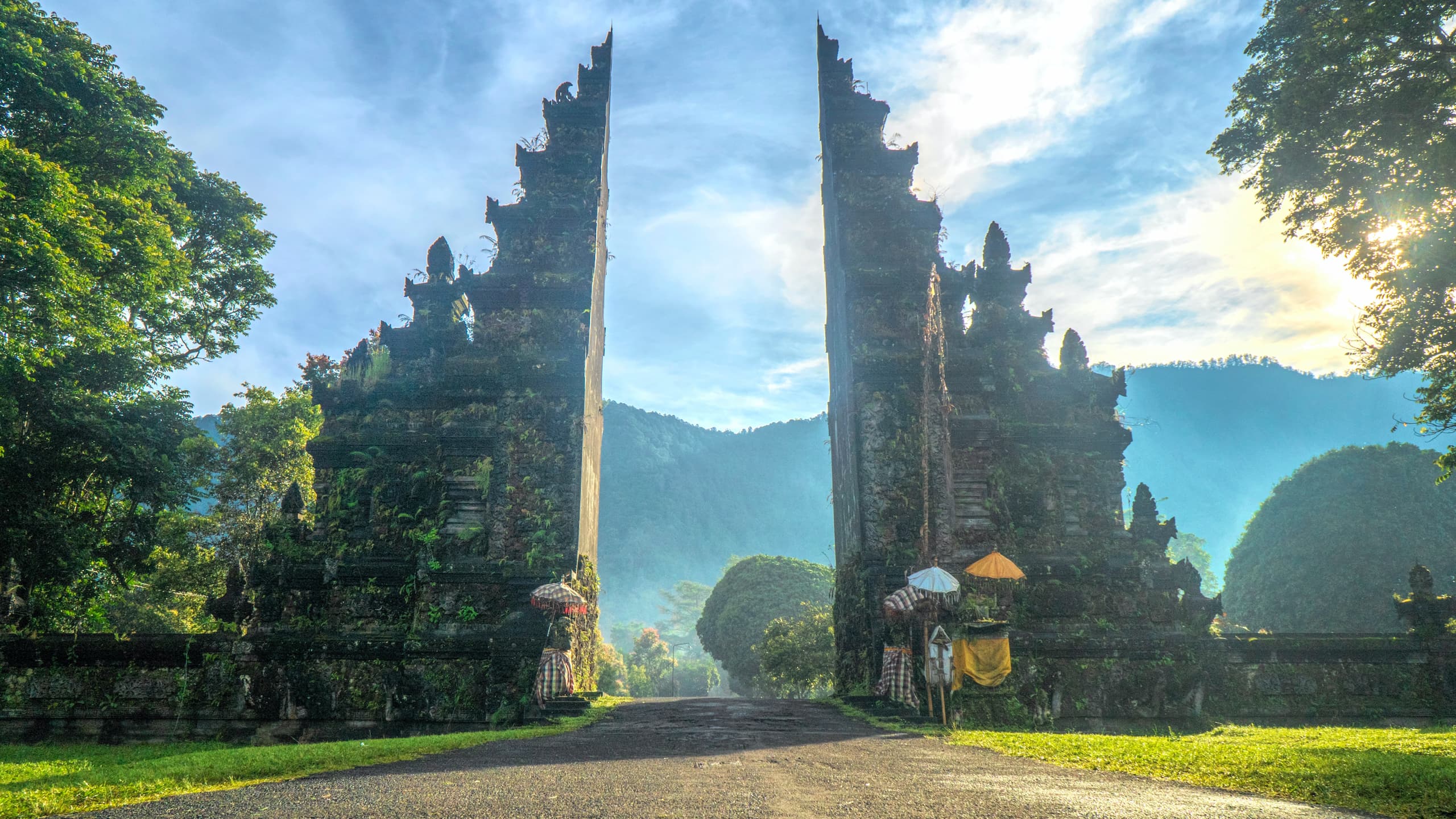What Is Bali
Bali is an Indonesian island famed for its stunning landscapes and deep-rooted culture. It has a unique blend of art, music, food, and traditional customs kept alive for generations. Each year, millions of tourists come to explore its varied terrain of jungles, beaches, and rice paddies. As well as this, ancient temples and religious sites are scattered throughout, displaying the island’s spiritual importance.
The Balinese culture is centered around ceremonies, festivals, and rituals that reflect their Hindu faith. They have a distinct way of life inspired by their religion and “canang sari” offerings to gods and spirits. Visitors are often warmly welcomed by locals and invited to immerse themselves in their customs.
What’s lesser known is that Bali is also a hub for creative arts such as painting, sculpture, woodcarving, dance, and music. Art plays an integral role in Balinese life, as it’s a medium to pass down customs and mythology.
A tourist recently got a surprise when her cab driver abruptly stopped in a solitary spot. To her amazement, she saw locals preparing a large offering of fruits and flowers. She realized that even though she’d visited many temples, this was a special peek into the vibrant world of Balinese rituals. Ready to broaden your cultural horizons faster than a Bali belly after trying every street food? Head to Bali!
Understanding The Culture of Bali
To understand the rich culture of Bali Indonesia, you need to explore the various facets of its society. Discover the religious beliefs of Bali, the vibrant traditional art and performances, and how they celebrate festivals. Each of these sub-sections offers important insights into the cultural practices of Bali that have been passed down for generations.
The Religious Beliefs of Bali
Bali is renowned for its mix of Hinduism, Buddhism, and animism. Here, locals think that the universe is full of spirits, including land and buildings. They present offerings named Canang Sari to please the spirits and gain protection.
This custom comes from Hindu teachings which dominate Bali’s spiritual landscape. Also, their belief system upholds the unity between nature and humans, leading to a mindful environment.
Intricate rituals, such as Nyepi Day, are celebrated yearly in March to renew the balance of good over evil. Before this special day, each village in Bali makes ogoh-ogoh statues to symbolize the negative thoughts within human minds.
Religion has a major influence on Balinese culture, which explains why they’re so tolerant to outsiders with diverse beliefs. It’s essential to understand their customs and behaviors to not upset any spiritual tradition.
Visit Bali for not only its beautiful scenery but also to soak up its exclusive spiritual atmosphere. Skip it, and you may miss out on experiencing what sets Bali apart from other attractive spots in the world.
Watching traditional Bali performances is like being at a music festival with everyone wearing gorgeous costumes and culture as the only headliner.
Traditional Bali Art and Performances
Bali’s vibrant cultural heritage of art and performances is a true reflection of its people, customs and beliefs. From the magical Kecak and Barong Dance dramas to soulful Gamelan orchestras, Bali’s traditional performances mix exotic costumes, music and storytelling. Thanks to Tourism, these exquisite traditional Bali art forms can be enjoyed in dedicated theatres or temple courtyards during festival seasons.
Every performance is a unique celebration of spirituality, mythology, history and humour – showcasing Bali’s creativity. The graceful Legong dance from ancient Balinese courts is performed by young girls displaying their choreography talents. Wayang Shadow Puppet shows reveal the rich symbolism of Balinese philosophy where good overcomes evil through tales from Hindu epics.
Adding elements like fire, water or animals gives each performance a distinctive character. Ubud’s famous theatres like Puri Saren Agung Palace offer nightly showcases featuring stage productions with tradition, music, dances and crafts from across the island.
Experience Bali’s jampacked calendar of festivities, with colourful parades and immersive rituals throughout the year. Tap your feet to the sounds of Joged dance at North Bali’s Lovina Beach Festival. Or, dive into purification rituals at Nyepi Day’s Silent Retreat, marking New Year’s Eve on Balinese Saka Calendar.
Don’t miss out on witnessing one-of-a-kind opportunities for experiencing Bali’s cultural art forms – unique gems in Southeast Asia! Get ready to dance, eat and pray your way into a whole new dimension of celebration. Who needs fireworks when you have the energy of a Balinese festival?
Celebrating Festivals in Bali
The Balinese people are well-known for their vibrant and diverse festivals. These celebrations display the deep-rooted customs and values of Bali. As a visitor, experiencing these festivals is ideal to become part of the island’s culture.
The famous Nyepi Day, also called the Day of Silence, marks the beginning of the Balinese calendar year. The colorful Galungan festival celebrates the victory of good over evil. You can find unique events throughout the year in Bali. Each one has its own set of rituals, such as offerings to deities and ancestors.
Kuningan is an unmissable ten-day event. People prepare yellow rice offerings known as ‘nasi kuning’. On the eve of Nyepi Day, the Ogoh-Ogoh parade occurs. Huge mythical creatures of bamboo and paper march down the streets before burning in a symbolic cleansing ritual.
You can join in the festival activities, like kite flying during Cultural Week or traditional dances like Legong. These events let you learn about Bali’s culture and earn respect for it.
Be sure to plan your visit around at least one of the main festivals. You don’t want to miss out on the vibrance, music and colors! A missed opportunity would be too regrettable!
Exploring The Natural Wonders of Bali
To explore the natural wonders of Bali Indonesia and to gain insight into its rich culture, delve into the beauty of Bali’s stunning landscapes. Immerse yourself in the alluring beaches of Bali, stroll through gorgeous rice terraces, and be awed by Bali’s majestic volcanoes.
The Beaches of Bali
The coastal beauty of Bali offers a glimpse into Indonesia’s natural wonders. White sand and clear blue waters adorn the stunning beaches, which are perfect for surfing, swimming, sunbathing or just lounging.
Swaying palm trees line the shore. You can also find black sand beaches and hidden coves. Local establishments provide lounge chairs and umbrellas, plus refreshments to enjoy the panoramic views.
Locals believe their island is blessed by the gods, making it a great spot for spiritual retreats. Tourists can explore ancient temples like Uluwatu and Tanah Lot, situated near beautiful beaches. You can learn about the history, experience traditions, and have unforgettable cultural experiences.
Forget the stairmaster! Climb the rice terraces of Bali for a killer workout.
The Rice Terraces in Bali
The Bali rice paddies are a sight to behold! Intricately designed terraces, crafted by skilled farmers over generations, stretch across the island. These terraces are a perfect blend of man and nature. A guided tour of the verdant vegetation will let you explore the history and culture of the age-old tradition of rice farming.
The terraces are also home to small ponds filled with freshwater fish that add tranquility to the environment. For an extra thrill, activities like hiking or cycling through the fields can be arranged.
Sometimes, hidden gems like a unique temple amidst the fields can surprise you. It’s said Balinese farmers use music to coax their crops into growing – anecdotal evidence suggests playing classical music yields healthier plants. This shows just how important rice farming is to Balinese culture. Their connection with nature influences all aspects of life on this tropical island paradise. Mount Agung may be a bit of a hot head, but it’s nothing compared to the traffic in Kuta!
Mount Agung and Other Volcanoes in Bali
Bali’s islands boast some amazing volcanoes. Mount Agung, the tallest of them, is a must-try for thrill-seekers. Its tough climb rewards you with stunning views of the landscape. If that’s not enough, check out the beautiful Tegalalang Rice Terrace in Ubud! But be sure to check with local authorities first – volcanic activity can be unpredictable. Warning: the food in Bali is so delicious, you might be booking your return flight from hospital!
Delicious Food in Bali
To discover the delicious food in Bali, you need to immerse yourself in Indonesian and Balinese cuisine, both of which are famous for their unique and diverse flavors. Take a stroll through the popular food markets and restaurants in Bali, and you’ll encounter an array of gastronomic delights that will satisfy your taste buds.
Indonesian Cuisine
Unveiling the true essence of Indonesia? Explore its culinary artistry! It’s one of the most substantial aspects of Indonesian culture. Rich & diverse cuisine, influenced by Indian, Chinese, & Western cultures.
A glimpse: Nasi Goreng (fried rice), Gado-gado (veg in peanut sauce), Sate (grilled meat skewers), Rendang (coconut beef). Nasi Padang from Sumatra, Soto from Java, Bebek betutu from Bali. Spices enhance flavors: coriander, cumin, turmeric, cardamom, nutmeg, ginger.
Exploring Bali’s unique flavors:
- Bali’s local cuisine has unique flavors that reflect its culture & beliefs.
- Babi guling (suckling pig) for special occasions with lawar (minced meat & veg salad).
- Jaja Laklak (small cakes with rice flour, suji/pandan extract, grated coconut, palm sugar syrup).
Pro Tip: When in Bali, don’t hesitate to try new dishes or ask locals for recommendations. You might uncover hidden gems beyond the typical tourist hotspots. If you’re feeling adventurous, why not try the Babi Guling – a meal where the pig is used from nose to tail.
Balinese Cuisine
Behold the wealth of Balinese cuisine! Embark on a culinary journey that combines food with culture. Balinese dishes are deeply attached to Hindu beliefs with a range of spices, sauces and ingredients exclusive to the island.
Take a look at the table:
| Dish Name | Description | Ingredients |
| Babi Guling | Roasted suckling pig | Pork, Turmeric, Lemongrass |
| Nasi Campur | Mixed rice dish | Steamed Rice, Vegetables, Meat |
| Lawar | A salad dish mixed with grated coconut, herbs, spices and meat or fish. | Meat or Fish, Grated Coconut |
| Sate Lilit ikan or ayam | Skewered minced fish or chicken satay. | Minced Meat (Fish/Chicken), Coconut milk |
Plus, don’t miss out on the hidden gems: Sumpiuh (frog leg soup) and Jaje Bali (sweet cakes). To experience Balinese gastronomy, here are the top 3 picks:
- Sample street-side eats. Try the Indonesian-style ‘babi kecap’ – slow-cooked pork with soy sauce.
- Visit a local’s home. Enjoy a home-cooked dinner that you won’t find in any restaurant.
- Take part in a cooking class. Learn traditional recipes from experienced chefs.
Indulge in the abundance of flavors and marvel at the cultural heritage of Balinese cuisine! Get ready for your food coma as you explore the popular restaurants and markets.
Popular Food Markets and Restaurants in Bali
Are you looking for amazing culinary experiences in Bali? Look no further! Here are some of the top food spots in this tropical paradise.
- Taste the fresh seafood at Jimbaran Bay Beach.
- Try the local delicacies like Babi Guling & Nasi Goreng at the markets.
- Experience an upscale dinner with incredible views at La Lucciola.
- Indulge in hip and trendy cafes with artisanal coffee and fusion dishes in Seminyak.
Seek adventure by visiting a night market. Fill your stomach with the delicious street food!
Pro Tip: Don’t miss the ‘Jamu’ drink which is made of natural ingredients like turmeric, ginger, and tamarind. It’s perfect to sip while exploring all the yummy treats in Bali.
Ready to go shopping? Bali markets offer food that’s almost too tasty to resist!
Shopping in Bali
To discover the best shopping experiences in Bali, check out Unique Handicrafts from Bali, Shopping in Bali’s Local Markets, and Exclusive Boutiques and Malls in Bali. Whether you’re seeking a cultural immersion through souvenirs that represent the traditional Balinese way of life, or a modern retail experience, these subsections in the Shopping in Bali section of Discovering The Rich Culture Of Bali Indonesia can help guide your shopping adventure.
Unique Handicrafts from Bali
Bali is a hub of art, culture, and creativity. It offers unique handicrafts that reflect its rich heritage. Here are some you must buy:
- Intricate Batik fabrics.
- Colorful paintings portraying Balinese life.
- Hand-carved wooden sculptures of religious motifs.
- Exquisite silver jewelry crafted by artisans.
The Balinese also produce fine ceramics, woven goods, and soaps.
Spiritual items such as Balinese masks used in traditional dance performances can be bought in Ubud’s shops. Art lovers may purchase Balinese-style oil lamps or antique wooden carvings.
Bring home these treasures of Bali and get a glimpse into its vibrant culture. Bargain like a pro in local markets to discover more!
Shopping in Bali’s Local Markets
Ready to explore Bali’s vibrant marketplaces? Dive into the sensory experience of the island’s traditional markets and uncover unique finds at unbeatable prices!
- Buzz of Bali’s Street Markets – Get lost in Sukawati Market or explore Pasar Sindhu in Sanur.
- Traditional Balinese Crafts – Wood carvings, batiks, and silver jewelry crafted by local artisans.
- Local Delicacies -Taste street foods like Nasi Goreng or Babi Guling. Grab exotic fruits like rambutan or durian.
- Bargain – Start at 50% less than the initial asking price.
Discover designer goods or organic skincare products at Kumbasari Art Market or Ubud Art Village. Shop souvenirs, gifts, and clothing items. Practice your bargaining skills – the best kind of therapy!
Exclusive Boutiques and Malls in Bali
Bali is a paradise for shopaholics seeking exclusive fashion and accessories. An array of boutiques and malls cater to the most discerning clientele. Biasa, Lulu Yasmine, and Magali Pascal offer chic clothing blending traditional Balinese elements with modern designs.
Shopping malls in Bali offer an experience like no other. Beachwalk Mall and Seminyak Village Mall have premium fashion, beauty products and excellent dining all under one roof. Ubud is also home to Batik shops, known for handmade fabrics with unique patterns inspired by Balinese culture.
For bargain hunters, Pasar Senggol Gianyar is a must-visit. Here you can find souvenirs and authentic Indonesian street food.
Hardy’s Sanur, Bali’s first mall, opened back in 1994 – long before the island became an Asian tourist magnet. This mall still has over 80 stores selling fashion, cosmetics, electronics and more, making it popular with both locals and visitors.

















































